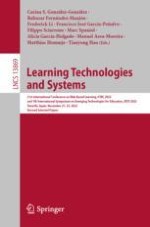2023 | Buch
Learning Technologies and Systems
21st International Conference on Web-Based Learning, ICWL 2022, and 7th International Symposium on Emerging Technologies for Education, SETE 2022, Tenerife, Spain, November 21–23, 2022, Revised Selected Papers
herausgegeben von: Carina S. González-González, Baltasar Fernández-Manjón, Frederick Li, Francisco José García-Peñalvo, Filippo Sciarrone, Marc Spaniol, Alicia García-Holgado, Manuel Area-Moreira, Matthias Hemmje, Tianyong Hao
Verlag: Springer International Publishing
Buchreihe : Lecture Notes in Computer Science
